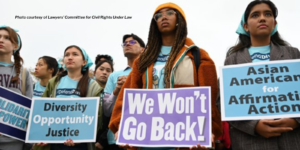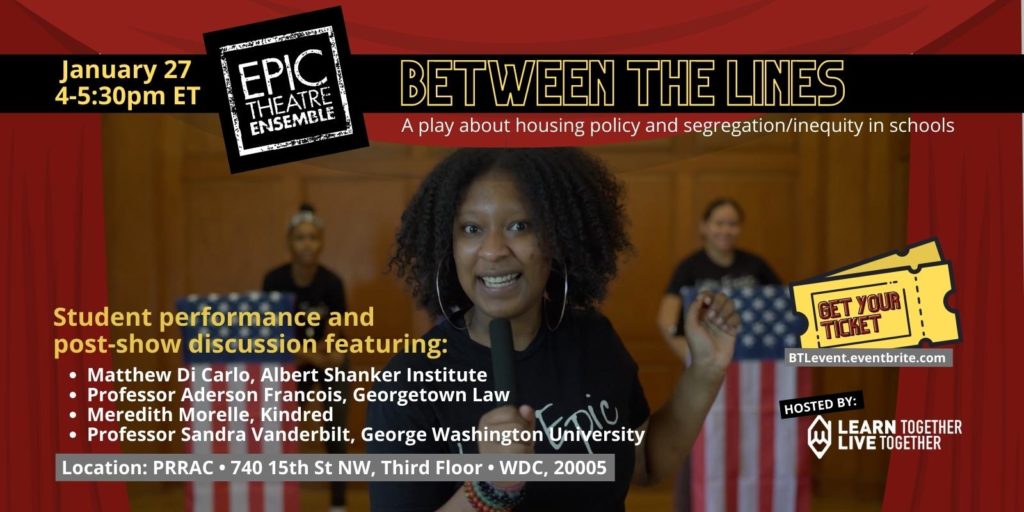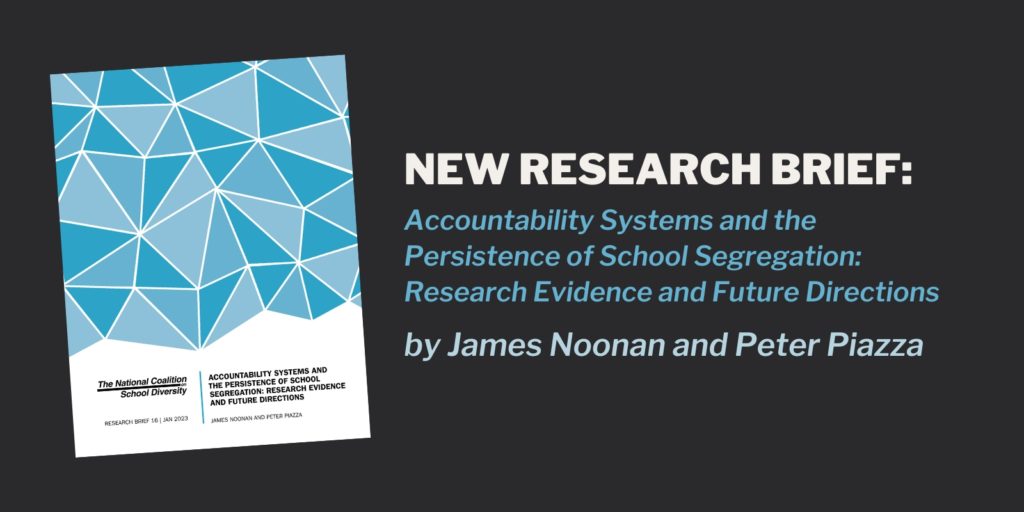Join us on the Hill (in person or virtually) on March 13 at 11:30am ET for a policy briefing hosted by The Civil Rights Project at UCLA. Featuring Sen. Chris Murphy (D-CT) and Sen. Alex Padilla (D-CA), and moderated by CRP co-directors Gary Orfield and Patricia Gandara.
Speakers include: Jacob Faber (New York University), Susan Faircloth (Two Feathers Consulting), Erica Frankenberg (Pennsylvania State University), Emma Garcia (Learning Policy Institute), Raul Hinojosa (UCLA), Carolyn Liebler (University of Minnesota), Ryan Pfleger, (UCLA Civil Rights Project), Jennifer Van Hook (Pennsylvania State University), Manuel Vazquez Cano (Education Northwest), and Kimberly Young (Culver City USD).
REGISTER TODAY.
February 20, 2024
FOR IMMEDIATE RELEASE
Washington, D.C. – February 20, 2024 – Today, the U.S. Supreme Court released an order denying a petition to take up the Coalition for TJ v. Fairfax County School Board specialized school admissions case. The decision comes after multiple deliberations following a petition for writ of certiorari filed by the Pacific Legal Foundation on behalf of the parent group challenging Virginia’s top-ranked public high school’s recently-adopted process for student placement.
The National Coalition on School Diversity (NCSD) and Georgetown Law’s Racial Equity in Education Law and Policy Clinic (REEL Policy Clinic) commend the Supreme Court’s order given its implications for educational access, diversity, and equity. This decision to deny certiorari comes the same year Brown v. Board of Education turns 70, which at its core recognized that K-12 public education is about ensuring equitable access to high-quality education for all students.
“Diversity in our nation’s schools is vital if we are to function as a multiracial democracy,” said Janel George, associate professor of law and director of the REEL Policy Clinic. “TJ has taken action to provide more children with access to its high-quality program, which is aligned with the goal of public education and with magnet schools historically.”
Last May, the Court of Appeals for the Fourth Circuit ruled to uphold the admissions policy for the selective-enrollment high school, finding that it had not discriminated against Asian American students as the plaintiffs alleged. One month later, the Supreme Court struck down affirmative action at Harvard University and University of North Carolina at Chapel Hill, ruling that such admissions policies violate the Equal Protection Clause of the 14th Amendment.
In crafting its colorblind rationale for the college admissions decision, the Supreme Court majority ignored the well-documented continuing impacts of systemic inequality and racial segregation in our nation’s public schools. Not only do schools remain deeply segregated by race and class, but students of color are more likely to attend underfunded and high-poverty schools with less effective instruction and reduced access to advanced coursework, extracurricular activities, and standardized testing preparation.
Within two months of the Supreme Court’s decision, the writ of certiorari was filed, asking the Court to declare that TJ’s pro-diversity admissions policy – which is explicitly race-neutral – violates the Equal Protection Clause. The changes to TJ’s process for student placement included 1) elimination of a standardized test, 2) establishment of new eligibility criteria (the top 1.5% of students at each public middle school who meet minimum standards); and 3) incorporation of a “holistic review of…students whose applications demonstrate enhanced merit.”
These changes aimed to acknowledge and help address the diminished educational opportunities, often correlated with a student’s race and socioeconomic background, due to long-standing and persistent systemic inequality. Following the murder of George Floyd and racial reckoning of 2020, the changes to TJ’s admissions policy can be seen as an attempt to provide a fairer chance for all students to access what is consistently ranked among the top ten best public high schools in the nation, according to U.S. News & World Report.
While the plaintiffs alleged that the 2020 changes to TJ’s process for student placement were designed to reduce the proportion of Asian American students at the school, Asian American students still made up the majority of students admitted under the new policy. Of the students who received offers to attend TJ, 54.36% were Asian, 22.36% white, 11.27% Latino, and 7.9% Black. The first freshmen class included more low-income students, Black and Latino students, English-language learners, and girls than prior classes. Moreover, for the first time in over a decade, all 28 middle schools in Fairfax County sent students to TJ.
Although no formal explanation for the denial is given, Justice Alito wrote a dissenting opinion, joined by Justice Thomas, which focuses mostly on challenging the Fourth Circuit’s reasoning that there was insufficient “disparate impact” to violate the Equal Protection Clause.
“The fact that only two justices dissented from the denial of Cert is a good sign,” said Philip Tegeler, a legal advisor with NCSD. “It means that, at least for now, a significant majority of the Court is unwilling to overturn the 2007 precedent that local school districts have the power, and the tools, to promote school diversity without selecting students on the basis of their race.”
Given this reality, NCSD and the REEL Policy Clinic express appreciation for the Supreme Court’s denial of the appeal. We will continue to fight and strengthen our collective efforts to promote equal educational opportunity in our nation’s public schools and help ensure every young person has a fair shot at achieving their full potential.
For media inquiries, please contact: Jenna Tomasello (jtomasello@prrac.org)
Founded in 2009, the National Coalition on School Diversity (NCSD) is a cross-sector network of 50+ national civil rights organizations, university-based research centers, and state and local coalitions working to expand support for school integration. NCSD supports its members in designing, enacting, implementing, and uplifting PK-12 public school integration policies and practices so we may build cross-race/class relationships, share power and resources, and co-create new realities.
The Racial Equity in Education Law and Policy Clinic (REEL Policy Clinic) centers its work on the intersections of education law, racial equity, and legislative advocacy. Student attorneys explore the origins of racial inequities in education and the role of law in entrenching or eliminating them. This work includes addressing issues that disproportionately impact the educational experiences and outcomes of students of color, including discriminatory school discipline practices, school segregation, resource inequities, and more.
###
Our latest fact sheet summarizes five legal challenges to recently-revised admissions policies used to determine which students can gain access to specialized middle and high schools. Such challenges have emerged in Philadelphia, PA (2022); Fairfax County, VA (2021); Boston, MA (2021); Montgomery County, MD (2020); and New York City, NY (2018).
The original complaints for these cases can be found below:
PHILADELPHIA, PA
Sargent, et al. v. School District of Philadelphia (2022)
PA_Sargent_Complaint
FAIRFAX COUNTY, VA
Coalition for TJ v. Fairfax County School Board (2021)
VA_TJ_Complaint
BOSTON, MA
Boston Parent Coalition for Academic Excellence Corporation v. The School Committee of the City of Boston, et al. (2021)
MA_Boston School Comm Complaint
NCSD Issues Statement on Supreme Court Ruling in Harvard and UNC Cases

Diversity in Our Nation’s Schools Promotes Educational Opportunity and Strengthens Our Democracy
In the face of the U.S. Supreme Court’s ruling in the Harvard University and University of North Carolina admissions cases, the National Coalition on School Diversity (NCSD) reiterates its unwavering commitment to defend our nation’s greatest strength—our multiracial diversity.
At NCSD, we firmly believe that diversity is not a mere buzzword but a cornerstone of educational excellence. When students from various backgrounds learn alongside one another, they gain invaluable insights that transcend textbooks and classroom lessons. Exposure to different perspectives, cultures, and ideas fosters critical thinking, empathy, and understanding. It equips students with the knowledge and skills necessary to thrive in our increasingly interconnected and multiracial democracy.
For nearly 50 years, efforts to achieve diversity in higher education have also played a crucial role in leveling the playing field and providing equitable opportunities to historically marginalized communities. Admissions policies that acknowledge students’ racial backgrounds, among other factors, recognize that systemic barriers – often tied to income and wealth disparities, residential segregation, and historical inequities – can hinder access to quality education.
Today’s Supreme Court decision makes our coalition’s work even more critical. Policies and practices that promote diversity in PK-12 schools play an important role in ensuring that our education system does not become even more racially fragmented, and that educational resources and opportunities are equitably distributed. NCSD calls on policymakers, education leaders, researchers, advocates, and organizers to demonstrate their unwavering commitment to school diversity. We must stand united in our determination to build a future where all students – regardless of income, zip code, or racial and ethnic background – are provided an education to realize their highest potential. The principles of diversity, equity, and inclusion are core to our efforts in achieving a stronger, more just, fair, and opportunity-rich America for all.
NCSD and our members remain resolute in our commitment to defending diversity and equity in our nation’s schools. In the words of several of our members:
“The Supreme Court’s decision goes against decades of social science evidence about the benefits of diversity and harms of segregation in K-12 and higher education. Efforts to ameliorate segregation and inequality in K-12 schools will be even more important to ensure equitable, integrated opportunities for children, youth, and to benefit our communities.” – Erica Frankenberg, Professor of Education and Demography and Director of the Center for Education and Civil Rights, Penn State
“Diversity in K-12 education is vital if our nation is to function as a multiracial democracy. All students benefit from diversity. Diversity in K-12 is even more urgent in light of the Court’s decision if we are to address inequities along racial lines that undermine higher education access, including resource disparities like inequitable access to experienced educators.” – Janel George, Associate Professor of Law and Director of the Racial Equity in Education Law (REEL) Policy Clinic, Georgetown Law
“All students deserve the opportunity to attend schools that are not only well-resourced but also diverse; both elements are critical to ensure equal educational opportunity. After today’s opinion, it’s more important than ever that ELC remains steadfast in our commitment to ensure that PK-12 schools provide students of all racial and socioeconomic backgrounds a fair shot to attend college and realize their full potential.” – Robert Kim, Executive Director, Education Law Center
“It is essential that K-12 educational leaders double down on their school integration efforts, using the many tools available to them to promote racial and socioeconomic diversity in order to prepare students for success in and after high school. The Century Foundation’s Bridges Collaborative has supported leaders from nearly 50 different school districts and charter schools across the country in promoting racial and socioeconomic integration in their schools and communities, and we stand ready to work with more.” – Stefan Lallinger, Executive Director of Next100 and Senior Fellow, and Halley Potter, Pre-K-12 Education Team and Bridges Collaborative Senior Fellow, The Century Foundation
“In the face of today’s Supreme Court setback, we will continue our work to ensure all students can bring their whole, authentic selves to the college admissions process. We reaffirm IDRA’s 50-year commitment to support students of color in overcoming persistent inequalities in K-12 education that create unfair barriers to college.” – Celina Moreno, President and CEO, Intercultural Development Research Association (IDRA)
“The Court has made a terrible historic error by telling the nation’s colleges to abandon what their experience has shown them are essential to preserving integration and opportunity. To reduce the loss of talent, educational leaders and policymakers must do all they can to help offset the rising college barriers for students of color. A first step should be a plan of action to repair the shamefully unequal preparation and counseling offered in our segregated high schools and increase access to strong magnet schools. When one gate slams shut, we must start opening others.” – Gary Orfield, Distinguished Research Professor of Education, Law, Political Science, and Urban Planning and Co-Director of The Civil Rights Project, UCLA
“As legally misguided and ahistorical as the Supreme Court’s decision may be, it does not impede the goal of racial and economic integration in K-12 schools. We need to persevere in our commitment to the goal of inclusive and diverse communities and schools.” – Philip Tegeler, Executive Director, Poverty and Race Research Action Council (PRRAC)
IF YOU AGREE WITH US, JOIN US.
For media inquiries, please contact: Jenna Tomasello (jtomasello@prrac.org)
Founded in 2009, the National Coalition on School Diversity (NCSD) is a cross-sector network of 50+ national civil rights organizations, university-based research centers, and state and local coalitions working to expand support for school integration. NCSD supports its members in designing, enacting, implementing, and uplifting PK-12 public school integration policies and practices so we may build cross-race/class relationships, share power and resources, and co-create new realities.

Our first #CiteNite will draw from NCSD’s recent research brief, “Accountability Systems and the Persistence of School Segregation: Research Evidence and Future Directions.”
Hear from authors James Noonan (Salem State University) and Peter Piazza (School Diversity Notebook), as well as experts Raquel Muñiz (Boston College) and David Martínez (University of South Carolina) on the topic of assessment and accountability as we explore the implications of the brief.
#CiteNite has been in the works for a long time, and is a collaboration with the School Diversity Notebook. It’s designed to be a quarterly discussion about research that can help guide and connect the school integration movement.
Register here.
If you’re a researcher or practitioner with an idea for a future #CiteNite topic, please get in touch!
Related Materials:
San Antonio Independent School District v. Rodriguez (1973) 50th Anniversary: Exploring the Link Between School Funding and Segregation
In recognition of the 50th anniversary of the landmark U.S. Supreme Court school funding case, San Antonio Independent School District v. Rodriguez (1973), this NCSD and IDRA Twitter chat aims to spark a conversation around the link between school funding and segregation. The Rodriguez case primarily held that Texas’ school finance system, based on property taxes, did not violate the Equal Protection Clause of the 14th Amendment, despite producing stark inequities in funding between districts. The Rodriguez Court made two other important findings: that education is not a “fundamental right” under the U.S. Constitution, nor is a person’s income status a protected class.
Today, policies that tie funding levels to local property taxes remain a standard practice. According to the National Center for Education Statistics, in FY20, nearly half (44.9%) of all U.S. public school revenue came from local funding, comprised mainly of property taxes. Since Rodriguez, however, state-level school finance litigation and policy reforms have caused shifts in the landscape over the last 50 years. Have these efforts successfully addressed the concerns at issue in Rodriguez?
To what extent does continued reliance on local property taxes systematically deny students living in areas of concentrated poverty equitable and/or adequate school funding? What would it take for all children to have access to diverse, well-resourced schools? What are the barriers to making this a reality? These are just a few of the questions we’ll explore during the chat.
#RodriguezAt50 Twitter Chat – Join us at @diverse_schools on Monday, March 20, 2023 at 1:00pm ET
Our latest fact sheet compiles news about four places that have been grappling with school transportation challenges and describes implications for integration, equity, and student success.

“Brilliance isn’t allocated along zip code but often your race is.”
On Friday, January 27, 2023, Learn Together, Live Together (LTLT) and the National Coalition on School Diversity (NCSD) will host the first-ever live performance and panel discussion of Between the Lines, a student-led play created by Epic Theatre Ensemble youth artist-researchers. The play, which was commissioned by NCSD and the Poverty and Race Research Action Council (PRRAC), explores the connection between housing policy and segregation/inequity in schools. Following a live performance, a panel of experts will provide additional context from their legal, research, advocacy, and educator perspectives. The youth performers and panelists will engage in a moderated discussion, followed by an audience Q&A period.
Panelists include:
- Matthew Di Carlo, Senior Fellow, Albert Shanker Institute
- Aderson Francois, Professor of Law; Director, Institute for Public Representation Civil Rights Law Clinic, Georgetown Law
- Meredith Morelle, Managing Director of National Programs, Kindred
- Sandra Vanderbilt, Assistant Professor of Research Methods, Graduate School of Education and Human Development, George Washington University
This in-person event is free and open to the public, masks are optional but encouraged, and light refreshments will be provided. A livestream option is also available for virtual attendees.
More information and registration here.

Our newest research brief, “Accountability Systems and the Persistence of School Segregation: Research Evidence and Future Directions,” looks at recent empirical research to consider what, if any, relationship exists between systems of accountability and the persistence of school segregation. Written by James Noonan and Peter Piazza.

In this new NCSD fact sheet, we summarize several recent studies and reports that further underscore the importance of K-12 school integration, including:
|
|




